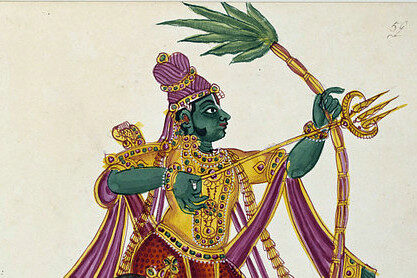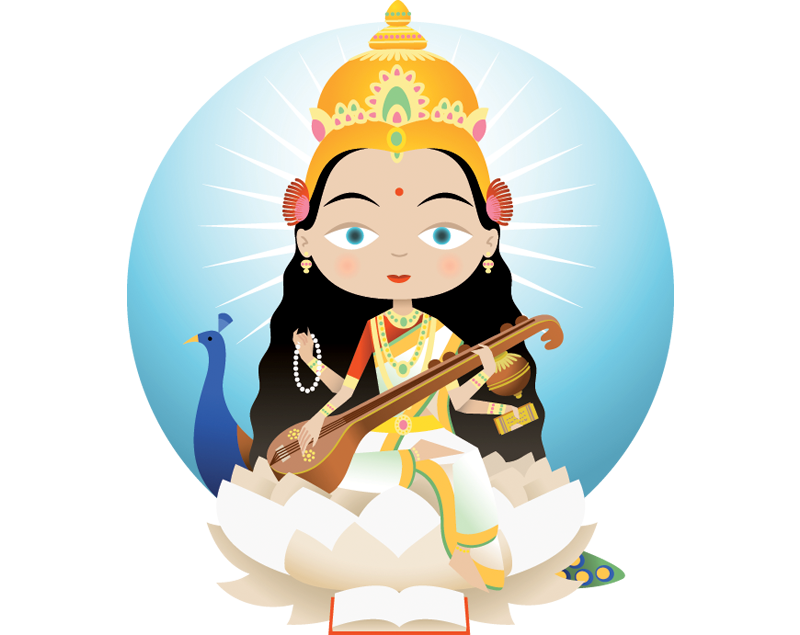

Everyone knows of Cupid, the Greek god of love who compels his victims to become gripped with uncontrollable longing.
Few know, however, that Hinduism also has portrayals of such a figure, referred to instead as Kamadeva, a Sanskrit name that means — yes, you guessed it — “god of love.” With descriptions that closely match that of Cupid, Kamadeva is depicted in Hindu texts as a beautiful winged youth who, armed with his bow and arrow, arouses overwhelming feelings of desire in his targets.
Because these feelings connote the hankerings of a carnal nature, Kamadeva’s arrows — five in number — each represent the successive effects such desire have on a person, described as infatuation, agitation, burning of the heart, an extreme dryness of life, and finally, destruction.
If unchecked, in other words, the fire of desire can wreak havoc, inciting one to commit unspeakable acts that lead to destruction. When fueled, however, by actual love, this fire can be transformed into a positive powerful force, providing the light and energy needed to perform inspiring feats, enabling one to overcome any and all obstacles.
Well aware of this reality, Hinduism is littered with stories of romance — many of them told in varying detail — conveying a myriad of the many lessons love and lust have to teach. Here are a few of them to get you started.
1) Samvarana and Tapati
There was once a king named Samvarana who, while hunting on a forested mountain slope, had to leave his horse, after it died from starvation and thirst.
Wandering the rugged terrain by foot, he suddenly came across a woman whose beauty was unlike that of which he had ever known. Amidst the creepers and trees, she stood like a statue of gold, her bodily form beyond any sort of earthly comparison. Her eyes, delicately shaped like the petals of a lotus, were hypnotic, stopping him in his tracks. And her presence, like the rays of the sun, seemed to bring light into his life, which before seeing her, could only have been spent in total darkness.
Deprived of his senses, he stood rooted to the spot, unable and unwilling to pull his gaze from her. Was she a human? Was she a goddess? Was she something more? Whatever she was, Samvarana — a king amongst kings, a destroyer of enemies — had met his match. In the company of this woman, he was completely and utterly conquered.
Pierced by the burning arrows of desire, he called out to the mysterious lady, but received no answer. Instead, like a flash of lightning, she vanished from his sight.
Bewildered, the king scoured the forest in a maddened state, but to no avail. She was gone. Giving up, he fell to the ground, overcome by grief.
Yet, just as she had left, suddenly she reappeared and, looking as radiant as the sun, revealed herself to be Tapati, a daughter of Surya, the Sun god. Just as Samvarana wished to be with her, she yearned to be with him, but explained that they could only be together if he gained permission from her father. Thus finishing her speech, she disappeared once again.
Unable to bear the separation, Samvarana indeed resolved to get Surya’s blessings, and so proceeded to perform austerities in honor of the god.
After 12 days of worship, Vashishta, Samvarana’s guide and priest, appeared before him. Understanding the king’s heart, and wanting to help him, he ascended the sky to meet Surya on the king’s behalf.
Believing Samvarana to be a more-than-worthy husband for Tapati, Surya gave his consent, allowing his daughter to return with Vashishta to Samvarana.
Overjoyed at Vashishta’s success, Samvarana swiftly married Tapati on that mountain and, like a god, proceeded to enjoy her company there for 12 years.
Not returning to his capital even once during that time, the kingdom began to suffer the consequences of his absence, as it became plagued by drought and the citizens grew emaciated from starvation. Noticing the progressive deterioration of the city and its people, Vashishta went to Samvarana, advising him to return home and perform his duties.
The king immediately assented to Vashishta’s request, and returned with Tapati to his capital, as the couple did the necessary work to revive the kingdom to its once prosperous state.
Though a relatively straightforward and simple tale, this story conveys several messages, the foremost of which being the importance of having a spiritual guide in life. The tendency to lose ourselves in the pursuit of desire, despite the dangerous consequences of overindulgence, exists in all of us. Though it’s unrealistic to simply give up such desire, having a spiritual mentor that can help guide one’s fulfillment of it, can be the difference between happiness and destruction.
2) Nala and Damayanti
This story, like so many others, begins with a beautiful princess who, having come of age, desired to be married.
Her name was Damayanti, and her beauty was such that even the gods attended her swayamvara (an ancient Indian event in which suitors would compete for a bride), each with the hope of winning her hand.
Damayanti, however, had no eyes for them. Though she had never met him, she had already fallen for a king named Nala, whose praises had reached her from his neighboring kingdom.
When he thus arrived at the ceremony, and thereafter won her hand, it seemed as if her marital aspirations had been fully realized, and that the two of them would live a happy life together.
But the gods were displeased when Damayanti chose Nala over them. The powerful and inimical Kali, particularly upset that the princess had accepted a mere mortal, sought revenge. A master of subtly, yet potently, bewitching people through their vices, Kali preyed on Nala’s weakness for gambling, tricking him into a game in which he lost everything and was subsequently forced into exile.
Faithful as she was, Damayanti followed Nala into the forest, but Nala, not wanting her to face the hardships of forest life, left her as she slept, believing that once alone, she would return to the shelter and comfort of her parents.
Sometime later, while wandering the forest alone, Nala came across a distressed serpent, which he saved from a forest fire. As it so happened, it was no ordinary creature, but a naga (a semi-divine being) named Karkotaka with supernatural abilities. Grateful for saving his life, Karkotaka bit Nala, the effect of which twisted him into an unrecognizable form. He then told the exiled king to take on a new identity, and travel to the kingdom of Ayodhya, where he should introduce himself as a charioteer and offer his services to the king Rituparna. When the time was right, he told Nala, everything he lost would be restored.
Damayanti, meanwhile, had in fact been discovered by her father and brought back to his kingdom. Though she hoped they could find Nala, years went by without any trace of him. Believing he was still out there somewhere, she decided to send letters out, inviting suitors for a second swayamvara. Perhaps, if he was still alive, news that Damayanti was looking for a new husband would be enough to force him out of hiding.
When King Rituparna received an invitation, and asked Nala to take him, Nala was indeed stricken with anguish. The opportunity to see Damayanti again, however, even if from afar, was too alluring to pass up. He thus did as he was asked, and drove the king to the ceremony.
Observing everyone upon their arrival, Damayanti couldn’t help but notice one of the charioteers. Though his deformed look was unrecognizable, his speech and movements were uncanny.
Walking up to the man, she asked, “What would compel a husband to desert a dutiful wife?” Realizing he had been discovered, Nala, with tears in his eyes, responded, “Knowing that he could not keep her in a manner fit for her.”
As he finished his reply, the final display of the nagas power went into effect, transforming Nala into his true form. Stirred by his answer, and elated to have finally found him, Damayanti placed a garland around his neck, choosing him as her husband for a second time, and showing to all who knew their story, that the strength of true love could persevere through even the most trying of times.
3) Arjuna and Chitrangada
There’s a part in the Mahabharata when Arjuna, one of the five Pandava brothers (the protagonists of the epic), spent a year in pilgrimage, after breaking a vow that forced him into a temporary exile from his home.
It was during this period, while traveling through neighboring kingdoms and states, that he visited the ancient and mystic city of Manipur, which was ruled by a king named Chitravahana.
Chitravahana had a daughter named Chitrangada, but because it was preordained that he would not be able to produce other children, he raised her like he would a warrior prince who would one day inherit the kingdom, as well as the duty to maintain and protect it.
When Chitrangada met Arjuna, she immediately became attracted to him, but felt insecure that perhaps her demeanor was overly militant, lacking the femininity that most men were enchanted by. Desperate for his love, she prayed to Kamadeva, who transformed her into a beautiful woman. Imbued with a new kind of confidence, she thereafter approached Arjuna, and found that she was easily able to win him over.
For some time, Chitrangada was elated, but eventually became restless, for deep down, she knew Arjuna was not in love with who she really was.
Before she could decide whether or not to tell him the truth, Manipur suddenly came under attack from intruders and, determined to protect her city, Chitrangada sprung into action, revealing her actual warrior form.
After the fighting subsided, with her enemies defeated, the reality that Arjuna had seen her began to set in, along with the fear that he might no longer want to be with her.
On the contrary, Arjuna, impressed by her bravery, skill, and strength of heart, loved her even more, revealing that the real light of her beauty shone not from her outward form, but from the spirit of her true self.
4) Savitri and Satyavan
Savitri’s quest for love begins differently from that of most like her in ancient times.
Though a renown princess, whose beauty and charm would have lured many hopeful suitors, she had no desire to sit passively as a medley of kings and princes she hardly knew competed for her.
Instead, she wanted to take a more proactive approach in the matter of her love life. When, therefore, she felt ready to be married, she gathered a party of her father’s best warriors for protection, and began wandering throughout the country in search of a husband of her choosing.
Traveling far and wide, she eventually came across a dense forest, in which lived an elderly exiled king, his wife, and their handsome son, Satyavan. Though they resided in a plain hut, with almost nothing to their name, they existed in happiness and comfort, as Satyavan provided for his parents by chopping wood and selling it in the countryside.
Captivated by the love and warmth they exuded, Savitri felt especially drawn to Satyavan, and swiftly concluded that she had come to the end of her search.
Wary of the fact that her daughter had fallen for an impoverished woodchopper, Savitri’s father became all the more downcast when a visiting saint told him that Satyavan had been previously cursed to die in a year. Nothing Savitri’s father said, however, could change her mind. She was in love with Satyavan and nothing would stop them from being together.
For some time, the couple lived a happy life together. Satyavan would regularly go deeper into the forest to chop wood, and sometimes Savitri would accompany him, weaving garlands under the cool shade of a tree as he did his work.
On one such day, about a year after they got married, Satyavan started to feel tired. Putting his axe down, he walked over to Savitri to take a break, resting his head in her lap as he closed his eyes. Suddenly the forest grew dark, and a towering figure appeared before Savitiri. It was Yama, the god of death, who had come to take her husband.
Unwilling to live a life without Satyavan, Savitri begged and pleaded with Yama to take her with him as well. He insisted it wasn’t her time yet but was impressed by her sincere dedication, and so granted her a boon of her choosing, as long as it wasn’t explicitly to save her husband’s life.
Thinking things through, Savitri cleverly requested that her father-in-law be able to watch his future grandchildren play in the garden. Touched by Savitri’s fierce and unyielding devotion, Yama relented, returning Satyavan’s life to his body. Yama may have been the god of death, but even he couldn’t help but feel humbled and subdued by the power of pure love and devotion.
5) Pingala the prostitute
In the ancient city of Videha, there once lived an alluring courtesan named Pingala, whose intoxicating beauty would incite deluging passion in many a king and merchant who crossed her path.
A master of her craft, she tended to her clients with an attention and skill that fulfilled all of their desires, yet was a true professional in her ways, always remaining detached in her dealings.
Still, one day she found herself overcome by desirous feelings of her own, falling for a young prince who seemed to reciprocate such feelings and promised to come see her.
On the morning of the day they were meant to meet, Pingala put extra care into the way she prepared, taking a long scented bath, dressing in the finest silk, adorning in shimmering jewelry, and weaving fragrant jasmine flowers into her hair.
The image of nothing less than a goddess, she went to their meeting spot and began to wait. Minutes passed and she checked the time. He was a little late, but surely there was a reason. Any moment now he’d arrive and they would finally be together.
But the minutes turned to hours, and as the sun made its way across the sky, the last of its light fading behind the horizon, Pingala’s hope too began to fade. But the minutes turned to hours, and as the sun made its way across the sky, the last of its light fading behind the horizon, Pingala’s hope too began to fade.
Though it was obvious the prince was not coming, she stood rooted to the spot, unable to leave. From longing to disappointment, Pingala waded through the river of her feelings, spending the entire night contemplating the pangs of her desire, and the transitory nature of sensual happiness.
Eventually, as the first light of dawn began to emerge, dissipating the darkness of night, a wave of detachment washed over Pingala, dissipating the darkness of her ignorance.
Able to think with a clear intelligence, she realized no amount of fleeting pleasure would ever be able to satisfy what she actually hankered for. The source of all happiness, the Divine, resided within her. As such, real love came not from the pursuit of desire, but from establishing a stronger connection with the origin of all existence.
Hence, feeling an immense sense of fulfillment, Pingala walked home, and peacefully fell asleep in her bed
So how does Pingala’s story make it into this small collection of “love stories” from the Hindu tradition?
Understanding her realization is actually key in understanding the fundamental lesson underlying all of Hinduism’s great romantic narratives.
Love and lust, as exhibited in a world anchored by the dualities of life, drive people to commit both honorable and deplorable acts. But when we connect with the origin of all, and are able to see everyone as part of the same spiritual family, we can transcend the onslaught of Kamadeva’s arrows and, in tune with a higher intelligence, act in a way that is of true love and service to all.













































